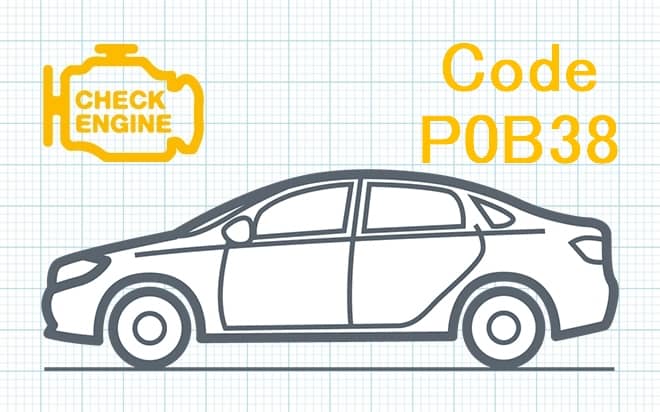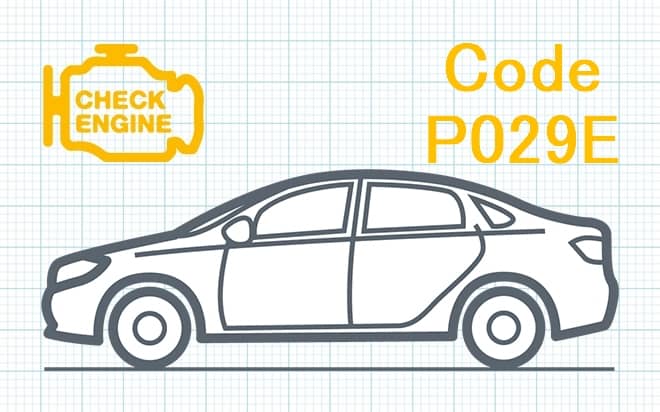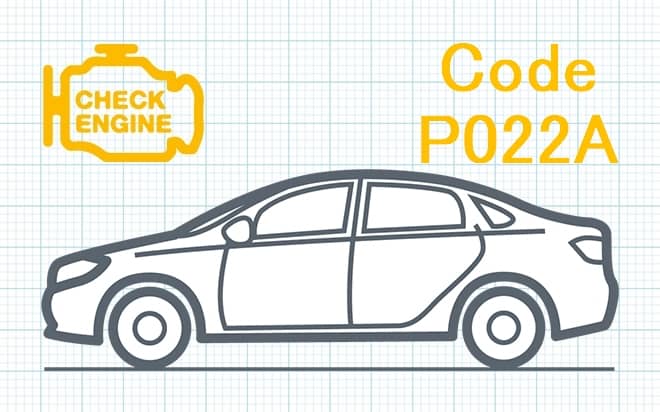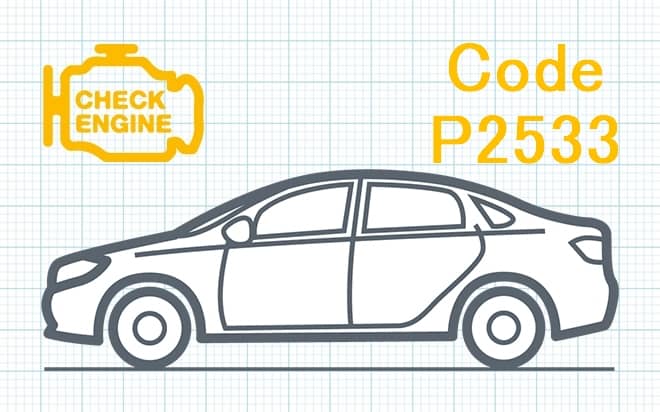Fault code P0300 is called “Random/Multiple Cylinder Misfire Detected” but in different programs it may be called differently. This fault designation applies to all vehicles equipped with OBD-II.
Technical description and explained code P0300
The OBD-II error code P0300 is a generic one that sounds like “Random/Multiple Cylinder Misfire Detected”. It is set when the PCM (Powertrain Control Module) detects ignition misses in multiple cylinders.
The ignition misfire detection system uses inputs that are sent to the PCM through special feedback circuits. If the PCM does not receive the feedback signal, it interprets this as an ignition failure.
Error P0300 indicates that ignition skips occur in two or more cylinders. They occur when an insufficient amount of fuel is burned in a cylinder. Efficient combustion is important. Because fuel combustion is the source of energy to run the engine.
Ignition misses in two or more cylinders can be caused by a variety of reasons. Due to a faulty ignition system, fuel system, or internal engine failure. Often the malfunction is caused by worn spark plugs, spark plug wires or a faulty coil.
Symptoms of vehicle malfunctions
The main signal that an error P0300 has occurred is the Malfunction Indicator Lamp (MIL) is also known as the CheckEngine Light.
It can also be warning signs such as:
- Check engine control lamp on the control panel will light up (the code will be written to the ECM memory as a fault).
- Engine stalls or starts poorly.
- Floating revolutions, and attempts to stall at idle.
- Bouncing/missing ignition at idle or under load.
- Poor acceleration.
- Increased fuel consumption.
- Reduced engine power output.
- Fuel odor coming out of the exhaust.
Failure P0300 is considered serious and shall be corrected as soon as possible. As prolonged driving with ignition skips can cause costly damage to the engine and catalytic converters.
Factors that can cause this error code
The error code P0300 can mean that one or more of the following problems have occurred:
- Faulty or worn spark plugs.
- Worn or damaged ignition leads.
- Failure of coil.
- Faulty oxygen sensor.
- Damaged fuel injectors.
- Vacuum leakage.
- Low fuel pressure.
- Faulty camshaft position sensor.
- Faulty crankshaft position sensor.
- Plugged exhaust gas recirculation pipes or valve.
- Clogged catalytic converters.
- Faulty air flow sensor.
- Throttle position sensor malfunction.
- Leaking cylinder head gasket.
- Low engine compression.
- Poor fuel quality.
- Sometimes the cause is a defective PCM module.
How to fix or reset OBD-2 code P0300
Some suggested steps for troubleshooting and fix the error code P0300:
- Use the OBD scanner to make sure there are no other errors. If they are present, it is recommended that they be repaired first.
- Inspect for loose connectors on ignition coils or damaged wiring. Also look for loose engine ground wires. This can cause accidental ignition misses. Tighten or correct if necessary.
- Check the condition of the spark plugs and their wires. Worn and old spark plug wires are common causes of accidental ignition skips. Replace plugs and wires if necessary.
- Fuel pressure should be measured. Low pressure can cause intermittent ignition failures in several cylinders. When the pressure is below specification, the engine does not receive the correct amount of fuel and begins to lean the mixture. The fuel pump or pressure regulator may be the source of the low pressure.
- Make sure the fuel injectors are working properly and are activated. Occasional ignition skips may be a sign of faulty or clogged fuel injectors, which need to be replaced. Also make sure that the fuel injector wiring is intact and properly connected.
- If the ignition system and fuel system are checked, you can perform an engine compression check and a leak check to see if there are any mechanical problems causing the ignition skips.
Diagnose and repair of problems
Sometimes there are no symptoms when a P0300 fault is detected. The easiest thing to do in this case is to simply reset the code and see if it comes back.
If the problem occurs in the form of irregular idling or engine jerking, check all wiring and connectors leading to the cylinders. Next, it’s worth checking the plugs, wires, and coils.
In some cases, a failed catalytic converter is the cause. If you smell rotten eggs in the exhaust, the catalytic converter should be replaced. Faulty fuel injectors, also should not be overlooked.
Accidental ignition skips, jumping from one cylinder to another and causing a P0300 trouble code, can be due to depleted fuel. This, could be due to a vacuum leak in the intake manifold or air getting past the airflow sensor. Also due to an exhaust gas recirculation valve stuck in the open position.
On which vehicles does this problem occur most frequently
Fault code P0300 can occur on different vehicles but there are statistics on which brands this occurs most often. Here is a list of some of them:
- Alfa Romeo
- Audi (A4, A6, Q7)
- BMW (E39, E46, X5)
- Cadillac (Escalade, SRX)
- Chery (QQ, Tiggo)
- Chevrolet (Aveo, Captiva, Cobalt, Cruze, Lacetti, Lanos, Rezzo, Silverado, Spark, Tahoe, TrailBlazer)
- Chrysler (300C, Intrepid, Pacifica, Town and Country, Voyager)
- Citroen (C5)
- Daewoo (Matiz, Nexia)
- Dodge (Caliber, Caravan, Intrepid, Neon)
- Fiat (Albea, Doblo, Punto)
- Ford (C-Max, Explorer, F-150, Focus, Fusion, Mondeo, Ranger)
- GMC (Safari)
- Geely (MK, MK Cross)
- Great Wall
- Honda (Accord, Civic)
- Hover (H3, H5)
- Hummer (H3)
- Hyundai (Accent, Elantra, Getz, H1, Matrix, Santa Fe, Solaris, Sonata, Tucson, i30)
- Infiniti (FX35, G35, QX56)
- Isuzu
- Jaguar (S-Type)
- Jeep (Commander, Grand Cherokee, Liberty)
- Kia (Ceed, Cerato, Picanto, Rio, Sorento, Spectra, Sportage)
- Lexus (GS300, GX470, IS250, LX470, RX300, RX350)
- Lifan (Solano)
- Mazda (3, 5, 6, CX-7, MPV, Millenia, Protege)
- Mercedes-Benz (S500, W166, W220)
- Mitsubishi (Carisma, Galant, Lancer, Montero, Outlander, Pajero, Space Star)
- Nissan (Almera, Maxima, Murano, Note, Patrol, Primera, Qashqai, Teana, Tiida, X-Trail)
- Opel (Agila, Antara, Astra, Corsa, Insignia, Meriva, Mokka, Vectra, Zafira)
- Peugeot (206, 307, 308, 406, 407, 607)
- Pontiac (Montana)
- Porsche (Cayenne)
- Renault (Clio, Duster, Kangoo, Logan, Megane, Sandero, Symbol)
- Saab (9-3)
- Skoda (Octavia, Superb, Yeti)
- Ssangyong (Kyron)
- Subaru
- Suzuki (Grand Vitara, Vitara)
- Toyota (Camry, Celica, Corolla, Highlander, Matrix, Prius, RAV4)
- Volkswagen (Amarok, Golf, Jetta, Passat, Polo, Tiguan, Touareg, Touran)
- Volvo (S40, S60, S80, XC90)
- Vortex
- GAZelle (Business, Chrysler)
- LADA (Granta, Kalina, Largus, Niva, Priora, Vesta)
- TagAZ (Tager)
- UAZ (Buhanka, Hanter, Patriot, ZMZ 409)
- VAZ (2105, 2107, 2110, 2111, 2112, 2113, 2114, 2115)
- Volga (Siber)
Fault code P0300 can sometimes be found with other errors. The most common are the following: P0021, P0100, P0101, P0102, P0131, P0133, P0135, P0151, P0170, P0171, P0172, P0174, P0201, P0202, P0301, P0302, P0303, P0304, P0305, P0306, P0308, P0340, P0341, P0363, P0404, P0420, P0422, P1297, P1303, P1336, P1396, P1682.
Video
https://www.youtube.com/watch?v=RQ0K3Cm9cYc





